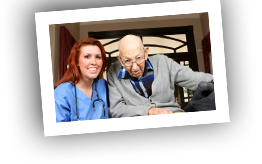Discussing Learning Objectives with Nursing Home Partner
Welcome back! We’ve thought about your learning objectives and and we have some ideas for you. Why don’t you let us know what you want to talk about first.
Click one of the learning objectives to get started. One of the staff members will be able to comment on the topic. Click the orange speech bubbles to listen. When you're done listening to the nursing home staff, advance to the next screen using the navigation bar above.
CloseOnce you finish this audio, you can advance to the next screen using the navigation bar above.
CloseClick a learning objective below.
- Examine the roles and associated responsibilities of RNs in a nursing home.
- Conduct assessments and apply evidence-based interventions related to common ‘geriatric syndromes.’
- Plan and provide person-directed care for residents.
- Participate in interdisciplinary activities.
- Examine the roles and associated responsibilities of other professions in the nursing home. (Review Module 3 on Learning about the RN role in nursing homes.)
- Manage and coordinate the nursing home care provided by a staff team for a group of residents.



